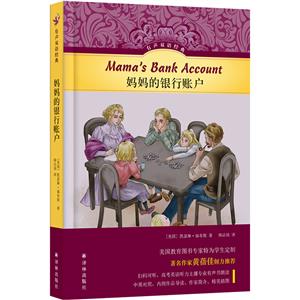-
>
(社版)玫瑰色的森林
-
>
(社版)金色的雨(精裝繪本)
-
>
(社版)海藍色的小水桶(精裝繪本)
-
>
(社版)白色的禮物(精裝繪本)
-
>
它們:水怪時代
-
>
家門口的大自然系列:奶奶的花園 奶奶的菜園(全2冊)
-
>
創意立體紙魔坊玩具書——賽車 作業車
有聲雙語經典:媽媽的銀行賬戶 版權信息
- ISBN:9787544791427
- 條形碼:9787544791427 ; 978-7-5447-9142-7
- 裝幀:一般膠版紙
- 冊數:暫無
- 重量:暫無
- 所屬分類:>>
有聲雙語經典:媽媽的銀行賬戶 本書特色
譯林“有聲雙語經典”精選貼近中國學生英語習得水平的經典作品。叢書甄選優質中文譯本,配以導讀、作家作品簡介和插圖,并聘請資深高考聽力卷主播朗讀英語有聲書。有聲書播放平臺操作便捷,只需掃描書中二維碼,即可收聽。叢書選目涵蓋各國經典文學作品,讓孩子在閱讀中提高文學鑒賞能力和英語聽讀能力。著名兒童文學作家黃蓓佳長文導讀推薦。 《媽媽的銀行賬戶》細細描繪了和諧的親子關系和溫暖的家庭環境,不僅可以給我們想象和體會的空間,更可以喚醒我們心靈深處關乎家人、朋友的溫情回憶。那些平淡卻閃耀的生活瑣事、單純又美好的人際往來,會讓孩子在成長道路上,走得穩當、堅定又從容。
有聲雙語經典:媽媽的銀行賬戶 內容簡介
卡特琳的父母由挪威移民到美國。卡特琳有一個哥哥和兩個妹妹,后來家里又添了一個小姑娘。這樣一個人口眾多的移民家庭,在經濟大蕭條的時代,日子可不容易過。媽媽作為全家的主心骨,借子虛烏有的銀行賬戶給兒女以安定與寬慰,竭盡全力維持生計,營造溫馨的家庭氛圍。她重視教育、看重品性,從物質生活到精神世界,都為孩子考慮周詳。在小說結尾,媽媽帶領全家,熬過經濟蕭條,覓得他鄉歸屬,維護了家庭的穩定和家族的完整,讓每個孩子都長成了可以獨立掌控自己人生的大人。
有聲雙語經典:媽媽的銀行賬戶 目錄
第二章 媽媽和無所事事的房客
第三章 媽媽和大都市
第四章 媽媽和她的小淑女們
第五章 媽媽和高雅文化
第六章 媽媽和畢業禮物
第七章 媽媽和大生意
第八章 媽媽的姨媽埃爾納
第九章 媽媽和伊麗莎白叔叔
第十章 媽媽和克里斯蒂娜
第十一章 媽媽和爸爸
第十二章 媽媽和外孫
CHAPTER 1 Mama and Her Bank Account
CHAPTER 2 Mama and the Idle Roomer
CHAPTER 3 Mama and the Big City
CHAPTER 4 Mama and Her Little Ladies
CHAPTER 5 Mama and the Higher Culture
CHAPTER 6 Mama and the Graduation Present
CHAPTER 7 Mama and Big Business
CHAPTER 8 Mama’s Aunt Elna
CHAPTER 9 Mama and Uncle Elizabeth
CHAPTER 10 Mama and Christine
CHAPTER 11 Mama and Papa
CHAPTER 12 Mama and the Grandchild
有聲雙語經典:媽媽的銀行賬戶 節選
自打我能記事起,卡斯特羅街上的這座小屋就是我們的家。家庭成員不僅有媽媽、爸爸、我唯一的兄弟內爾斯,而且有妹妹克里斯蒂娜,她和我年齡*接近,可她神秘又內斂——還有個*小的妹妹,叫達格瑪。 媽媽的四位姐姐,也就是我們的姨媽經常來串門。珍妮姨媽是其中*年長的,也是*喜歡指揮人的。我們還有西格麗德姨媽、瑪爾塔姨媽和沒出嫁的特里納姨媽。 姨媽們有個老單身漢舅舅,也是我的舅公,他叫克里斯,人稱“黑挪威”。他每次出現時,極不耐煩,大喊大叫,腳步聲很重。他給我們單調乏味的日子帶來了神秘與興奮。 但我*先想到的還是媽媽。 我記得每周六晚上,媽媽都會坐在擦洗干凈的餐桌旁邊,一向舒展的眉頭變得緊皺,她在數爸爸帶回家的裝在小信封里的錢。 錢被分成幾摞。 “給房東的。”媽媽邊說邊摞起一堆大銀幣。 “給雜貨店老板的。”又摞起一堆硬幣。 “卡特琳的鞋要打個前掌。”媽媽數出幾枚小銀幣。 “老師說這周我要準備一本筆記本。”說這話的可能是克里斯蒂娜、內爾斯或我。 媽媽會鄭重地拿出一個五美分或十美分硬幣,把它放在一邊。 我們屏氣凝神地看著錢堆慢慢變小。 *后,爸爸會問:“就這些了吧?” 看到媽媽點點頭,我們便放松了一些,這才伸手去拿教科書和家庭作業。那時,媽媽會抬起頭,面露微笑。“挺好,”她低聲說道,“我們沒必要去大銀行了。” 媽媽的那個銀行賬戶真的很棒。我們都為此驕傲。它給我們一種溫暖、安全的感覺。我們認識的其他人沒有在市中心大銀行里存錢的。 我記得這條街上的詹森一家就因為付不起房租而被趕出家門。我們注視著體格龐大的陌生男人把家具往外搬,也偷偷瞥見了可憐的詹森夫人羞愧的眼淚,我因為突然的害怕而感到窒息。這樣的事情就發生在那些沒有“房東”那摞硬幣的人們身上。這樣的暴力事件有沒有可能,會不會發生在我們身上呢? 我抓緊克里斯蒂娜的雙手。“我們有個銀行賬戶。”她平靜地安慰我,突然間我又能呼吸了。 內爾斯從文法學校畢業后想讀高中。“挺好。”媽媽說。爸爸也點頭贊同。 “這需要花點錢。”內爾斯說道。 于是我們迫不及待地搬來了椅子,圍著桌子坐了一圈。我把一個色彩艷麗的盒子從高處拿了下來,那是有一年圣誕節西格麗德姨媽從挪威寄給我們的,我小心翼翼地把盒子放在媽媽面前。 這是“小銀行”。你得明白,不要和市中心的大銀行搞混。“小銀行”是被用來應對突發的緊急情況的,比如那次克里斯蒂娜摔斷了胳膊,不得不被送去看醫生;還有一次達格瑪得了哮吼,爸爸得去藥店買藥放在蒸汽鍋里。 內爾斯把花費全部工整地寫了下來。車費、服裝費、筆記本和日用品的費用。媽媽久久地看著這些數字。然后她數了數小銀行里的錢。這些不夠。 媽媽噘了噘嘴。她溫柔地提醒我們:“我們不會非得想要去那個銀行吧。” 我們都搖了搖頭。 “我放學后可以在狄龍的雜貨店里干活。”內爾斯自告奮勇道。 媽媽朝他粲然一笑,費力地寫下一個數目,加加減減了一番。爸爸在大腦里完成了這項計算。他算得很快。“這不夠。”他說。之后他把煙斗從口中拿出,看了好一陣子。“我戒煙。”他突然說道。 媽媽把手伸到桌子對面,摸了摸爸爸的衣袖,可是什么也沒說。她又寫下了一個數字。 “每周五晚上我可以照看埃爾溫頓家的孩子,”我說,“克里斯蒂娜能幫我。” “挺好。”媽媽說。 我們都感覺非常好。我們又跨過了一個里程碑,并不需要去市中心從媽媽的銀行賬戶里提錢。小銀行就目前來說是足夠的。 For as long as I could remember, the small cottage on Castro Street had been home. The familiar background was there; Mama, Papa, my only brother, Nels. There was my sister Christine, closest to me in age, yet ever secret and withdrawn—and the littlest sister, Dagmar. There, too, came the Aunts, Mama’s four sisters. Aunt Jenny, who was the oldest and the bossiest; Aunt Sigrid; Aunt Marta; and our maiden Aunt,Trina. The Aunts’ old bachelor uncle, my Great-uncle Chris—the “black Norwegian”—came with his great impatience, his shouting and stamping. And brought mystery and excitement to our humdrum days. But the first awareness was of Mama.I remember that every Saturday night Mama would sit down by the scrubbed kitchen table and with much wrinkling of usually placid brows count out the money Papa had brought home in the little envelope. There would be various stacks. “For the landlord,” Mama would say, piling up the big silver pieces. “For the grocer.” Another group of coins. “For Katrin’s shoes to be half-soled.” And Mama would count out the little silver. “Teacher says this week I’ll need a notebook.” That would be Christine or Nels or I. Mama would solemnly detach a nickel or a dime and set it aside. We would watch the diminishing pile with breathless interest. At last, Papa would ask, “Is all?” And when Mama nodded, we could relax a little and reach for schoolbooks and homework. For Mama would look up then and smile. “Is good,” she’d murmur. “We do not have to go to the Bank.” It was a wonderful thing, that Bank Account of Mama’s. We were all so proud of it. It gave us such a warm, secure feeling. No one else we knew had money in a big bank downtown. I remember when the Jensens down the street were put out because they couldn’t pay their rent. We children watched the big strange men carry out the furniture, took furtive notice of poor Mrs. Jensen’s shamed tears, and I was choked with sudden fear. This, then, happened to people who did not have the stack of coins marked “Landlord.” Might this, could this, violence happen to us? I clutched Christine’s hands. “We have a Bank Account,” she reassured me calmly, and suddenly I could breathe again. When Nels graduated from grammar school he wanted to go on to High. “Is good,” Mama said, and Papa nodded approvingly. “It will cost a little money,” Nels said. Eagerly we brought up chairs and gathered around the table. I took down the gaily painted box that Aunt Sigrid had sent us from Norway one Christmas and laid it carefully in front of Mama. This was the “Little Bank.” Not to be confused, you understand, with the big Bank downtown. The “Little Bank” was used for sudden emergencies, such as the time Christine broke her arm and had to be taken to a doctor, or when Dagmar got croup and Papa had to go to the drugstore for medicine to put into the steam kettle. Nels had it all written out neatly. So much for carfare, for clothes, for notebooks and supplies. Mama looked at the figures for a long time. Then she counted out the money in the Little Bank. There was not enough. She pursed her lips. “We do not,” she reminded us gently, “want to have to go to the Bank.” We all shook our heads. “I will work in Dillon’s grocery after school,” Nels volunteered. Mama gave him a bright smile and laboriously wrote down a sum and added and subtracted. Papa did it in his head. He was very quick on arithmetic. “Is not enough,” he said. Then he took his pipe out of his mouth and looked at it for a long time. “I give up tobacco,” he said suddenly. Mama reached across the table and touched Papa’s sleeve, but she didn’t say anything. Just wrote down another figure. “I will mind the Elvington children every Friday night,” I said. “Christine can help me.” “Is good,” Mama said. We all felt very good. We had passed another milestone without having to go downtown and draw money out of Mama’s Bank Account. The Little Bank was sufficient for the present.
有聲雙語經典:媽媽的銀行賬戶 作者簡介
凱瑟琳??福布斯(1909—1966),原名凱瑟琳??麥克萊恩??安德森。1909年出生于美國舊金山。她是移民后裔,祖母在19世紀從挪威到達美國。她曾是廣播電臺的文字編輯,1942年偶然在《讀者文摘》上發表了兩個小故事,居然大受好評。于是她一鼓作氣,寫了一系列風格類似的小故事,并在1943年將之集結成書,命名為《媽媽的銀行賬戶》。這本書登上當年《紐約時報》的暢銷書榜,并且多次被改編為影視作品、舞臺劇等藝術形式,持續受到讀者的歡迎。由于慢性疾病的侵擾,福布斯在20世紀40年代后期逐漸停止了創作。她于1966年去世。
- >
羅庸西南聯大授課錄
- >
中國歷史的瞬間
- >
回憶愛瑪儂
- >
自卑與超越
- >
新文學天穹兩巨星--魯迅與胡適/紅燭學術叢書(紅燭學術叢書)
- >
小考拉的故事-套裝共3冊
- >
煙與鏡
- >
李白與唐代文化
















